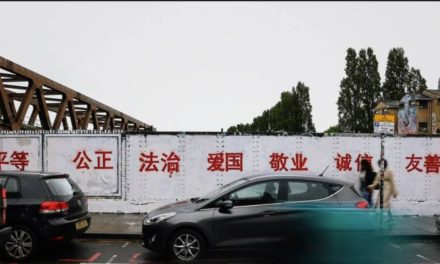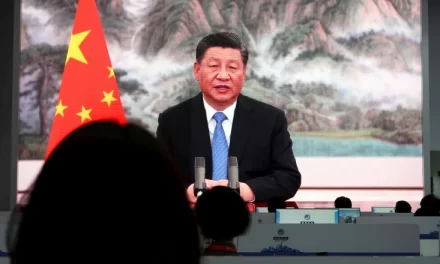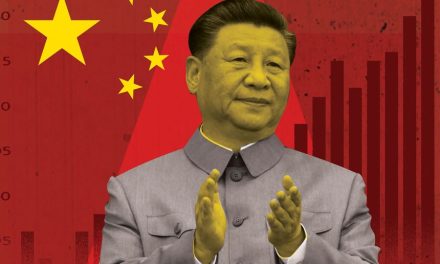By Dr. Jianli Yang
On March 13, the Italian magazine IL Foglio published this article by Dr. Jianli Yang. We are privileged to share it with you with its English translation.
“A person without trust cannot stand, a business without trust cannot thrive, and a nation without trust will decline.”—An Old Chinese Saying
The February 28 confrontation between Ukrainian President Zelensky and U.S. President Trump and Vice President Vance at the White House reminded me of scenes of classic gangster movies about extortion. However, this was not a story about a small business owner being bullied by thugs and seeking protection from the mafia. Instead, it involved the president of a democratic nation, Ukraine, which is under attack by authoritarian Russia, and the president of the United States, the leader of the free world and a major keeper of the rule-based liberal international order.
This scene at the White House shocked the world, and even Chinese people who do not have access to much information took notice. Many Chinese people left comments on the U.S. Embassy’s Weibo account, condemning and mocking the actions of U.S. leaders:
“The values that the world has upheld for 100 years were destroyed by your great president in just a few days. What a shame!”
“The day the Statue of Liberty was shamed.”
“A day of shame for America.”
These comments clearly show that these Chinese people are not supporters of the authoritarian Chinese Communist Party (CCP) government; they believe in the values of freedom and democracy. They also support the rule-based liberal international order led by the United States, which has been in place for nearly a century. It can be inferred that people in every corner of the world, generation after generation, who have been oppressed, also believe in these values and see the democratic world, represented by the U.S., as their hope for the future.
In 2002, I was arrested by the Chinese government as one of the leaders of the Chinese democracy movement. I was interrogated over a hundred times. Almost every time, the interrogators, acting on behalf of the all-powerful communist regime, would remind us that we had no cards in our hands. However, we did not think so. Deep in our hearts, we knew we had strong cards because we recognized that every human being, including our Chinese compatriots, desires freedom, and that the free world led by the U.S. was on our side.
In my case, the U.S. did not let me down. The U.S. made tremendous efforts for my freedom, including the president, secretaries of state, the treasury secretary, bipartisan congressional members, human rights groups, my American alma maters, and ordinary citizens. I gained my freedom and returned to the U.S. in 2007. I had cards in my hand, and I won. (Perhaps Zelensky believed he had cards in his hand for the same reasons; history is yet to determine whether this was his major mistake or not.)
Do not think that only Chinese democracy and human rights activists or dissidents have such feelings. During the five years I was imprisoned by the Chinese government, except for the 15 months I was held in solitary confinement, I was imprisoned with a variety of ordinary criminals. Whenever there was a power outage and the surveillance cameras stopped working, they would shout, “United States of America, come and save us!” Although they were considered criminals and not good people in the eyes of others, their experiences in China had instilled in them a sense of value and emotional orientation that led to such outbursts.
There is a heart-wrenching story from the prison where I was held. A young offender, about 20 years old, was sentenced to death for stealing two motorcycles during a period of “struck hard” on crime. On the eve of his execution, he told fellow inmates on death row that he did not know if there was an afterlife, but if there was, he would not agree to be reborn unless he saw the Stars and Stripes outside. If he saw the Chinese flag, he would refuse to be born again.
I have shared this story in many speeches in the U.S., and it has moved many Americans, including bipartisan congressional leaders, to tears. Now, I am certain that my fellow Chinese, from all walks of life, whether in prison or not, will have significantly reduced their affection, trust, and admiration for democracy in the U.S. I am also unsure how many U.S. leaders would still be willing to listen to me tell these stories.
The U.S. shift on the Ukraine issue reflects the Trump administration’s transactional approach to international relations, where values are sacrificed for deals. This approach is evident in other issues as well. Washington declared a trade war on close allies like Canada and Mexico, demanded that Denmark sell Greenland to the U.S., and asked Panama to hand over the Panama Canal, both of which are U.S. allies. The U.S. moved to withdraw from the World Health Organization and the UN Human Rights Council, both of which the U.S. helped found. It attempted to shut down most of its foreign aid programs to the world’s poor, reversing a tradition of generosity dating back to World War I. Most alarmingly, it considered abandoning NATO and even annexing Canada.
It is unclear what benefits these policies will eventually bring to the U.S., but the losses are already clear. The U.S. has suffered losses in terms of morality and credibility, and its trustworthiness worldwide has significantly decreased. For example, a recent Angus Reid Institute survey found that 79% of Canadians view the Trump administration unfavorably, and 73% view the U.S. unfavorably. Only 15% of Canadians consider the U.S. a valued partner and ally. This is the reaction from the public in traditional democratic ally countries. The reactions from leaders are also noteworthy.
The European Union leaders’ reactions are well-known, but it is worth observing the Italian Prime Minister Georgia Meloni, who has tried to establish close relations with the Trump administration and has a personal relationship with Elon Musk. Despite this, the Italian government’s trust in the U.S. has decreased. The Italian government is having doubts about completing a $1.6 billion deal with Elon Musk’s Starlink, citing concerns related to the U.S. retreat on commitments to European security.
What is even more noteworthy is the reaction in Eastern Asia.Singapore, for instance, a country that has skillfully maintained good relations with the U.S. in a region dominated by China while recognizing the U.S. as a global guardian, saw its defense minister say after the White House incident that the image of the U.S. “has changed from liberator to great disrupter to a landlord seeking rent.” People in Taiwan watched nervously as the Trump administration turned on Ukraine in favor of the aggressor Russia.
Most telling is the reaction from Russia and China, the two major challengers to the rule-based liberal international order led by the U.S.
Russian leaders, including former President Dmitry Medvedev, celebrated the White House clash, with Medvedev calling it a “proper slap down” for Zelensky. He referred to Zelensky as an “insolent pig” and praised Trump for telling him the truth about the risks of escalating the conflict. The Kremlin welcomed the apparent shift in U.S. relations with Ukraine, seeing it as aligning with their own foreign policy goals and Putin’s narrative on the Russia-Ukraine war.
Following the White House incident, Chinese media commentary focused on the weakening of the U.S.-led Western political order and the perils of relying on the U.S. for support. The People’s Daily, the major mouthpiece of the CCP regime, noted in a March 2 editorial that the meeting was “a stark reminder of the shifting dynamics of global diplomacy and the challenges faced by nations navigating an increasingly unpredictable international landscape.” China, another supporter of Putin’s narrative (now the U.S. is), can hardly conceal its secret delight and schadenfreude.
As a student of international relations, I understand that international stability relies on the balance between two pillars—interests and values. Even as a human rights activist, I do not naively believe that morality, justice, and democratic values are the sole principles for establishing national relationships and maintaining international order. However, the shift in U.S. foreign policy under Trump means that the U.S. is cutting away the pillar of values, moving towards another extreme. For nearly a century, the U.S. has been the main supporter of this pillar, and thus the rules-based liberal international order established and maintained by the U.S. is now trending towards collapse. Singapore’s senior leader, Lee Hsien Loong, summed up the challenge the world faces: “The U.S. is no longer prepared to underwrite the global order. This makes the international environment far less orderly and predictable.”
As a democracy fighter, I feel immense sadness because if the U.S. is no longer a beacon of hope for democracy, global democratic forces will be weakened, and democracy will lose its appeal to people in authoritarian countries. Their confidence in pursuing democracy will be severely undermined, and it may take a long time to recover. This only benefits the world’s dictators.
When the pillar of values is cut away, future international relations will be dominated by naked self-interest, returning to a might-is-right jungle state. If we could go back to the situation 100 years ago, we would be lucky. Today, humanity faces potential threats from modern information technology that have not yet been addressed, and the post-American trust era will inevitably stimulate many countries to develop nuclear weapons, leading to nuclear proliferation. As a member of humanity, I am deeply concerned.
As a student of history, I understand that no superpower has endured for long, primarily because each has been driven by raw power rather than a commitment to uphold international justice values. I once believed in American exceptionalism because, although the U.S. has done many things that do not fully align with moral principles, it has been the greatest power maintaining international justice over the past century. However, in just a few months, this role has been destroyed by the U.S. itself, and the U.S. has lost the trust of the international community. The damage has been done. As former Polish President and 38 other Polish political prisoners from the Soviet era said in an open letter to President Trump, “The history of the 20th century shows that whenever the United States sought to distance itself from democratic values…, it ultimately became a threat to itself.”
As someone who owes his freedom and even life to the U.S. and loves it more than most Americans do, I hope that American democracy can muster extraordinary strength, as it has every time it has faced crises and challenges throughout history, to repair the damage and revive American democracy. Otherwise, America would prove no exception.
Dr. Jianli Yang is the Founder and President of Citizen Power Initiatives For China and author of For Us, The Living: A Journey to Shine the Light on Truth and It’s Time for a Values-Based “Economic NATO”.
This article first appeared in the Italian magazine IL Foglio on March 13, 2025.
Source: https://www.ilfoglio.it/esteri/2025/03/13/news/la-sfida-al-mondo-democratico-lanciata-da-trump-vista-da-un-dissidente-cinese-7510336/
























